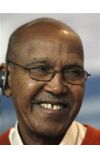
23 Sep 2011 01:41:51
Farah, 65, has lived largely outside Somalia since the early 1960s. Describing it as one of the world's most "lied about" countries, both by foreigners and Somalis themselves, he hopes his books help paint a truer picture of what life, and people, are like there.
Farah spoke about writing, exile and his hopes for Somalia.
Q: How much of this trilogy is based on real life?
A: "Much of it is, in the sense that obviously the names change, the situations change. But the story, the basic narrative, remains unaltered. The reason is, I try as much as I can to follow the story of Somalia before it becomes history. Obviously what I try to do is to give an alternative version to the version being given by those in power, those who are victims. I'm not one of those who sides with either group. I try to be on the side of what we call journalistic justice."
Q: In general, you say you would like your books to become the basis of a story before things change. What inspired this particular book in the trilogy?
A: "Obviously, when one writes the first of a trilogy, one has the third part in mind -- insofar as one can have a vague idea of what goes into it. Then naturally one has to, as a writer, adjust and re-adjust to make the story being told fit in with what has come before. So the third part has been determined to a certain extent by what went into the previous ones -- the characters, and so on and so forth. Then once you re-introduce the same characters, the situation will have changed. Somebody will be ten years older, maybe the wife has died, maybe he is sick, maybe he's older. Therefore you have to follow the guidelines of the people about whom you are telling the story.
"In total, the three books are set in Somalia and about the civil war, that's something they share in common. The second thing they share is that concerned Somalis (have) returned from places of comfort outside Somalia to witness for themselves, for different reasons, what is happening in the country."

